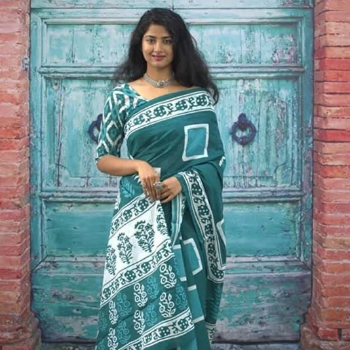In the bustling streets of Mumbai, where tradition seamlessly blends with modernity, lived a woman named Asha. Asha, a 32-year-old marketing executive, was known for her sharp intellect and unwavering dedication to her career. However, beneath her professional façade lay a deep-seated emotional struggle that many urban Indian women face today—a disconnection from cultural roots and a longing for self-acceptance.
As a child, Asha adored the vibrant sarees her mother wore, their colors and patterns telling stories of heritage and resilience. But as she grew older and her life became a whirlwind of corporate meetings and deadlines, Asha found herself drifting away from her cultural identity. Her wardrobe was filled with Western attire that, while professional, did little to celebrate the rich tapestry of her Indian heritage. This disconnection gnawed at Asha's self-esteem, leaving her feeling like a stranger in her own skin.
One day, while scrolling through her social media feed, Asha stumbled upon a striking saree from Monisha's collection. The saree was a masterpiece—a blend of traditional craftsmanship with a contemporary twist. Its vibrant hues and intricate designs seemed to whisper stories of tradition and modernity, much like the life Asha led.
Intrigued, Asha decided to purchase the saree, hoping it would fill the void she felt inside. Little did she know, this simple act would set her on a transformative journey. When the saree arrived, Asha unfurled it with a mix of anticipation and nostalgia. Its fabric was soft yet sturdy, the colors vibrant yet elegant. As she draped it around herself, Asha felt an unexpected surge of confidence and pride.
Wearing the saree to a family function, Asha experienced something magical. Compliments flowed her way, not just for her appearance but for the grace and poise she exuded. She felt a reconnection with her roots, a renewed sense of belonging. The saree, with its intricate patterns and vibrant colors, became a symbol of her identity—a beautiful blend of tradition and modernity.
Asha's story is not unique. Many urban Indian women face the challenge of balancing their professional lives with their cultural identities. In a world that often prioritizes Western ideals of beauty and fashion, the saree offers a powerful counter-narrative. It is a garment that embraces the diversity and richness of Indian culture while allowing women to express their individuality.
Monisha's saree didn't just solve a practical problem for Asha—it addressed an emotional one. It helped her rediscover her confidence and pride in her heritage, offering a sense of belonging in a rapidly changing world. The saree became more than just a piece of clothing; it was a symbol of empowerment and self-love.
Incorporating traditional attire like sarees into daily life can be a powerful act of self-expression for modern Indian women. It allows them to celebrate their roots while confidently striding into the future. For Asha, the saree was a reminder that she could embrace her cultural identity without compromising her modern lifestyle.
If you find yourself in Asha's shoes, yearning for a connection to your heritage, consider the transformative power of a saree. It's not just about the fabric or the design—it's about what it represents. Embrace the elegance and stories woven into every thread, and let it guide you on your journey of self-discovery and acceptance.
In conclusion, Monisha's saree did more than enhance Asha's wardrobe; it transformed her outlook on life. By embracing her cultural identity, Asha found a newfound confidence that resonated in every aspect of her life. Let Asha's story inspire you to discover the elegance within, and remember that sometimes, the simplest solutions hold the greatest power to heal and transform.
Visit Vyaparify Site:
https://id.vyaparify.com/kathu-monisha 
